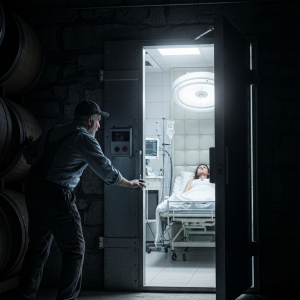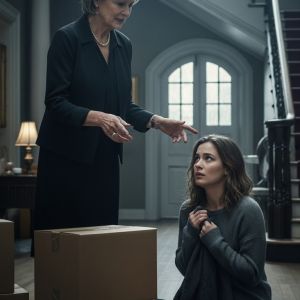My best friend, Clare, had always dreamed of being a mother. Ever since we were teenagers, she’d constantly talk about what kind of mom she’d be. So when Julia was born, Clare was over the moon. Our daughters, Julia and my Emma, grew up together like sisters, spending weekends and holidays at each other’s houses.
Fast forward fifteen years. Clare asked if I could watch Julia for a week while she took a solo vacation to Bali. It wasn’t unusual; Clare liked her breaks, and Julia practically lived at my house anyway. The first two days were fine—typical teen stuff, Netflix marathons, and junk food. But on day three, things took a dark turn.
At dinner, I called Julia down from her room, but she didn’t answer. Emma said she hadn’t seen her since lunch, and a weird feeling settled in my stomach. I walked upstairs and knocked on her door. Nothing. I tried opening the door, but it was locked. Julia never locked her door. Something was off. I grabbed the spare key and opened the door, my heart pounding.
Julia was lying on her bed, barely breathing, surrounded by empty medication bottles and a folded note. My vision blurred as I dialed 911. Emma stood frozen behind me, crying, asking what was happening, but I couldn’t find the words. Everything happened fast. The ambulance arrived, and I was answering questions from EMTs while frantically texting a neighbor to watch Emma. On the ambulance ride, I called Clare. She was still at the resort.
Through choking sobs, I told her what had happened. But instead of sounding even remotely worried, Clare hesitated, then said, “Is it really that serious? Maybe she just wanted attention.”
I felt my stomach drop. My head spun in disbelief. At the hospital, the doctor explained Julia needed her stomach pumped. I texted Clare immediately. Surely now she’d realize how serious it was. But Clare’s next message knocked the wind out of me: “Changing flights is $200. It’s expensive. Plus, you don’t have to go to the hospital every day. That’s literally what nurses are for.”
I stared at my phone, my blood boiling. I wanted to scream, but I knew Julia needed me more than Clare’s drama. I took off work, used my vacation days, and spent three straight nights in the hospital chair beside Julia’s bed. One night, she told me she thought Clare didn’t love her anymore. She asked why her mom wasn’t coming back for her. I didn’t know how to respond. I just hugged her, feeling a wave of anger in my chest.
Throughout all this, I sent Clare constant updates. Meanwhile, she posted beach selfies, captioning them, “Living my best life.” It hit me then that the Clare I knew, the devoted mom she always claimed to be, had completely vanished.
When Julia was discharged, I prepared a safe, comforting room for her at my place. I tried countless times to talk to Clare about the situation, but she brushed it off every time. Clare finally showed up at my house a full day after landing, deeply tanned and relaxed. She gave Julia an awkward half-hug, then immediately asked about the luggage she’d left before her vacation.
As I explained Julia’s recovery plan, Clare’s eyes darkened. Suddenly, she snapped. She stood up, accusing me of “parenting her child behind her back.” Her voice got louder, and she started shouting about me overstepping boundaries and blowing things out of proportion. “It was probably just for attention,” she spat.
That’s when I heard a choked sob from the hallway. Julia stood frozen, tears streaming down her cheeks. Clare barely glanced at her daughter.
“Are you kidding me?” I shouted. I yelled at Clare that she chose the beach over her own child, but Clare just scoffed, rolling her eyes. “Teens are dramatic. You should have known better.”
That was it. I snapped. I told her she was selfish, that she’d consistently put herself first, that Julia’s life was apparently only worth $200 to her. Clare’s voice lowered, venomous and cold. “You don’t understand what it’s like, needing a break from your kids.” At that exact moment, something between us shattered completely.
Clare grabbed Julia’s bag and demanded she leave. But Julia locked herself in my bathroom, sobbing uncontrollably, refusing to go. And that’s when Clare lost it. She began yelling, accusing me of kidnapping her daughter. Before I knew it, her phone was out, and she was calling the police.
“Go ahead,” I said. “Call them. Let’s see what they think about a mother who wouldn’t interrupt her vacation when her daughter was in crisis.” That only made Clare angrier. She stormed out and came back twenty minutes later with two police officers.
She was actually claiming I was kidnapping her daughter. I showed the officers Julia’s discharge papers and tried to explain the situation. Clare interrupted constantly, spinning some tale about me being obsessed with her daughter.
The female officer asked if she could try talking to Julia. After some coaxing, Julia unlocked the bathroom door. She looked terrible, red-faced and trembling. The moment she emerged, Clare started in on her, “Julia, stop this ridiculous behavior right now! You’re causing a scene for no reason!”
The officers exchanged glances. The female officer suggested they talk to Julia privately. While they were talking, Clare paced the hallway, loudly complaining about me “poisoning” her daughter against her. Emma, who’d been sitting quietly, started recording Clare on her phone without anyone noticing.
After about fifteen minutes, the officers returned. “This seems beyond our jurisdiction,” Officer Martinez said. “This is a family matter that needs professional intervention.” She made a call, and a CPS worker named Ms. Thompson arrived about an hour later.
Ms. Thompson interviewed Julia privately. When she finished, she suggested that Julia stay somewhere she felt safe for 72 hours while proper evaluations could be conducted. Clare looked like she might explode but apparently realized making another scene in front of CPS wouldn’t help. “Fine,” she said. “But I want to get some of her things from the guest room.”
I didn’t trust Clare alone, so I went with her. As soon as we were upstairs, she turned on me. “You think you’ve won? I’m going to destroy your life for this. Julia is my daughter, not yours. I’ll make sure everyone knows what kind of person you really are.” What Clare didn’t know was that Emma had followed us and was recording from the hallway.
That night, my phone blew up. Clare had started posting on social media that I was mentally unstable and had kidnapped her daughter. Some friends were asking what was going on. Some were already taking Clare’s side. The next morning, I took Julia to her scheduled therapy appointment. I was waiting in the reception area when Clare barged in, demanding to participate. “I’m her mother! I have every right!”
The therapist, Dr. Chen, calmly asked to speak with Clare privately. While they were talking, Julia whispered to me, “There’s something I haven’t told anyone. The reason I did what I did… I found messages on Mom’s phone. She was texting her friend about how much she resents being a mother, how she wishes she could just leave and never come back.” My heart broke for her.
About twenty minutes later, Dr. Chen emerged, looking concerned. Clare stormed out behind her, yelling that Dr. Chen was “biased and unprofessional.” She didn’t even look at Julia as she left. Dr. Chen recommended that Julia remain in a stable, supportive environment—meaning our home—at least temporarily.
Back at my house, we got a notice that Clare had filed for an emergency custody hearing. But then Ms. Thompson from CPS called. She explained that Dr. Chen had filed a report expressing serious concerns about Clare’s parenting. The emergency hearing had been postponed pending a formal investigation.
That should have been a relief, but it just marked the beginning of the battle. Clare started calling and texting Julia constantly, alternating between guilt trips and love bombing. News about the situation spread. Most of our friends were supportive once they understood, but Clare managed to convince a few people that I was trying to “steal her daughter.” One afternoon, in an ice cream shop parking lot, we ran into Clare’s best friend, Megan. She immediately pulled out her phone and started filming us, yelling about “parental alienation.”
The CPS 72-hour cool-down period was almost up, and I was a nervous wreck. The night before, Julia had the worst panic attack I’d ever seen. She couldn’t breathe, her whole body shaking, and she kept saying, “Please don’t make me go back.”
My sister, Natalie, a family attorney, arrived the next morning. “You did good keeping records,” she said, reviewing the screenshots and recordings. “This will help, but family court can be unpredictable.”
Ms. Thompson from CPS arrived for a follow-up. “Based on my investigation and Dr. Chen’s report,” she told us, “I’m recommending temporary guardianship be granted to you. However, Clare has hired an attorney who’s fighting this hard. There’s going to be a hearing tomorrow.”
The family court was smaller than I expected. Clare was already there, sitting beside a slick-looking attorney, a slight smirk on her face. The judge was an older woman named Judge Patel. “I’ve reviewed the reports,” she said. “I’d like to speak with Julia privately in my chambers.”
Clare’s attorney immediately objected, but the judge overruled him. Those fifteen minutes were the longest of my life. When they returned, Julia looked drained but calmer. Judge Patel adjusted her glasses. “Based on all evidence before me, including my conversation with Julia, I’m granting temporary guardianship to Mr. and Mrs. Reynolds for a period of 30 days, during which a complete family assessment will be conducted. Mrs. Davis will have supervised visitation twice weekly. Additionally, I’m ordering Mrs. Davis to complete a psychological evaluation and attend parenting classes.”
Clare stood up, her face red. “This is ridiculous! She’s my daughter!”
“Mrs. Davis, control yourself, or I’ll hold you in contempt,” the judge warned.
The look Clare gave me as we left the courtroom was pure hatred. The 30-day guardianship was just the beginning of a war. Clare missed her first two supervised visits, then showed up to the third one smelling of alcohol. She continued her social media campaign, twisting everything.
The worst part was the impact on Julia. She’d start to make progress, then see one of her mom’s posts and spiral again. Three weeks in, Clare escalated, showing up at Julia’s therapy appointment and creating a scene. That same day, someone keyed my car, scratching the word “THIEF” into the driver’s door.
Two days before the 30-day review hearing, we were blindsided. Clare’s attorney filed an emergency motion claiming Julia’s father, Mark, wanted custody. This made no sense. Clare had always told us Mark abandoned them and wanted nothing to do with Julia.
“This is a delay tactic,” Natalie explained. “But if Mark really is in the picture, maybe we should talk to him.”
With Julia’s permission, Natalie hired a private investigator who tracked down Mark Hansen in a town about three hours away. To our surprise, he asked to video chat with all of us that same evening. When his face appeared on the screen, I was struck by how much Julia resembled him.
Mark explained his side of the story. He and Clare had split up when Julia was two. He paid child support and had regular visitation until Julia was four, when Clare moved away. She promised to work out a new schedule, but then started making excuses. Eventually, she stopped answering his calls. He’d hired an attorney, but Clare kept moving. When Julia was seven, he received a cease and desist letter from Clare’s attorney, claiming his “harassment” was causing Julia emotional distress. “The letter said Julia was afraid of me,” Mark said, his voice breaking. “I didn’t want to traumatize my daughter, so I backed off.” He showed us a box of returned letters and cards he’d sent over the years.
“She told me you left because you didn’t want a kid,” Julia said, crying quietly.
“I never stopped trying, Julia,” he said sadly. “I never stopped loving you.”
The extended custody hearing finally arrived. Mark attended, not to seek custody himself, but to support Julia’s desire to stay with us. His testimony about Clare’s parental alienation clearly impacted the judge. The real bombshell came from Clare’s current boyfriend, Taylor. He testified that Clare had confessed to him that she deliberately kept Julia from her father and had been using her daughter for social media content.
Clare completely lost it in the courtroom, screaming that Taylor was lying. The judge extended my guardianship of Julia for six months, with Clare limited to supervised visitation once a week.
Outside the courtroom, Clare stormed up to me. “This isn’t over,” she hissed. “You’ve turned everyone against me, but I’ll get my daughter back.”
Life settled into a new normal. Julia continued therapy, started visiting Mark and his family on weekends, and even returned to school part-time. Clare, meanwhile, attended one parenting class before dropping out. Then came the cyberbullying. Julia received dozens of texts from unknown numbers, calling her horrible names. Someone had distributed her number. We reported it, but the damage was done. Emma then found a fake profile of Julia, supposedly confessing she’d made up the entire incident for attention.
The police traced the harassing texts to a burner phone purchased near Clare’s apartment. The store’s security footage clearly showed Clare buying the phone. She was arrested for cyberbullying, harassment, and violating the restraining order.
The final custody hearing was scheduled. The evaluator recommended primary physical custody remain with us, with Mark having regular visitation. Clare would be allowed monthly supervised visits once she completed her treatment program. In the courtroom, we braced for objections, but Clare surprised everyone by accepting the arrangement. “I recognize that my behavior has hurt my daughter,” she said, her voice steady. “I’m committed to getting better so I can be the mother she deserves.”
Outside the courtroom, Clare approached us cautiously. “Julia,” she said, “I know you don’t believe me right now, and I don’t blame you. But I’m trying to change. I hope someday you’ll give me another chance.” Julia nodded stiffly but didn’t speak.
That night, I found Julia sitting on our back porch swing. “Sarah,” she said finally, “thank you for saving my life. Not just that night, but every day since.”
I wrapped my arm around her, my throat tight. “You’re the one who did the hard work, Jules. I’m just grateful I get to see the amazing person you’re becoming.”
“I used to think I didn’t matter to anyone,” she said softly. “Now I know that’s not true.”
Our journey was far from over. But for the first time in months, I felt genuine hope for Julia’s future, and for all of us. The broken friendship with Clare would always be a painful chapter, but in its place, something stronger had formed: a chosen family, built around Julia’s well-being




